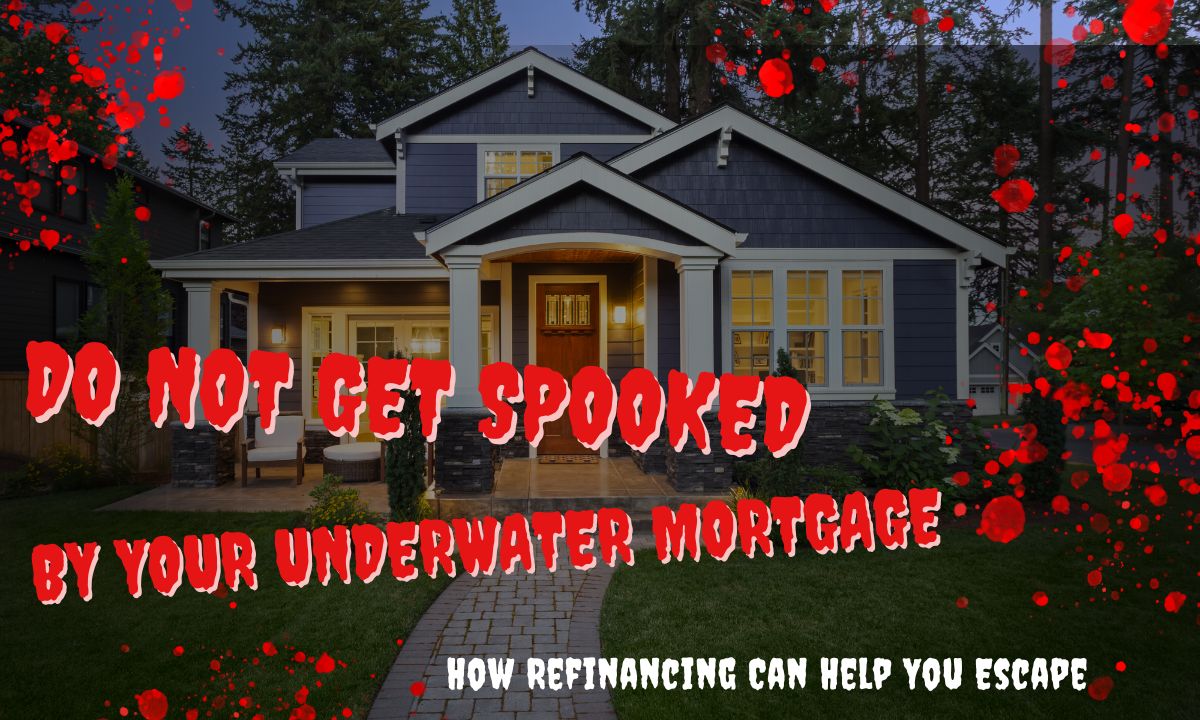 It’s Halloween season, and while it’s fun to enjoy spooky decorations and scary movies, there’s nothing fun about feeling haunted by your mortgage—especially if you owe more on your home than it’s currently worth. If you’re feeling trapped in an underwater mortgage, don’t let it send chills down your spine! Refinancing your mortgage can be the solution to break free, no matter how far underwater you are.
It’s Halloween season, and while it’s fun to enjoy spooky decorations and scary movies, there’s nothing fun about feeling haunted by your mortgage—especially if you owe more on your home than it’s currently worth. If you’re feeling trapped in an underwater mortgage, don’t let it send chills down your spine! Refinancing your mortgage can be the solution to break free, no matter how far underwater you are.
What Is an Underwater Mortgage?
An underwater mortgage occurs when the balance you owe on your home loan is higher than your home’s current market value. This can happen for a variety of reasons, including market fluctuations, neighborhood decline, or unforeseen economic conditions. While being underwater can feel like you’re stuck in a haunted house, it’s important to remember that you have options, and refinancing might be the best way to make your mortgage situation more manageable.
Government Programs for Underwater Homeowners
One of the most effective ways to refinance when you’re underwater is through special government-backed programs designed for homeowners who owe more than their home’s value. The Federal Housing Administration (FHA) offers the FHA Streamline Refinance, a program that makes it easier for underwater homeowners to refinance without needing to meet home equity requirements. Similarly, the VA Interest Rate Reduction Refinance Loan (IRRRL) provides an option for veterans and service members to refinance their VA loans into lower interest rates or more favorable terms, even if they owe more than their home is worth. These programs are like finding a flashlight in the middle of a dark maze—helping you see a way out when you might feel lost.
Conventional Refinancing Options
But what if you don’t qualify for a government-backed refinance? Don’t let that give you nightmares! There are still conventional refinancing options available for underwater homeowners. Many lenders offer refinancing solutions that can help you secure a better interest rate or switch from an adjustable-rate mortgage (ARM) to a fixed-rate loan. Switching to a fixed-rate loan can give you the security of stable monthly payments, so you’re no longer spooked by the unpredictability of fluctuating rates. Even when home values are down, these options allow you to take control of your financial future and breathe easier, knowing that your payments are more manageable.
Shortening Your Loan Term
Refinancing also offers the opportunity to shorten your loan term. If you currently have a 30-year mortgage, for example, you could refinance into a 15- or 20-year loan. While your monthly payments may be higher with a shorter-term mortgage, you’ll be able to pay off your loan faster. This can be especially helpful if you’re looking to rebuild equity more quickly. When home values eventually rise again, you’ll be in a stronger financial position, and the mortgage that once felt like a curse will no longer weigh you down.
Don’t Let Your Mortgage Haunt You
Refinancing might sound intimidating, but it doesn’t have to be. With the right lender or program, you can escape the clutches of your underwater mortgage and gain financial peace of mind. Don’t let the fear of being underwater keep you from exploring your options. By refinancing, you can lock in a lower rate, secure more favorable terms, and potentially shorten your loan’s lifespan—all of which will help you regain control of your finances.
Remember, Halloween is the season for ghosts and ghouls, not for being haunted by your mortgage. With refinancing options available, you don’t have to live in fear of your underwater mortgage forever. Instead, you can transform a seemingly spooky financial situation into an opportunity to improve your future.
 Saving for a down payment can feel overwhelming, but with some creative strategies, you can make it happen faster than you think. Whether you’re a first-time homebuyer or looking to upgrade, these tips can help you reach your goal and set you on the path to homeownership.
Saving for a down payment can feel overwhelming, but with some creative strategies, you can make it happen faster than you think. Whether you’re a first-time homebuyer or looking to upgrade, these tips can help you reach your goal and set you on the path to homeownership. Retirement planning is about ensuring you have a steady income stream to support yourself comfortably. For many retirees, tapping into the equity in their homes becomes an attractive option. Two terms often come up in this context: reverse mortgage and Home Equity Conversion Mortgage (HECM). Although they are related, there are some critical differences between them. Understanding these options can help you make an informed decision about what suits your financial needs.
Retirement planning is about ensuring you have a steady income stream to support yourself comfortably. For many retirees, tapping into the equity in their homes becomes an attractive option. Two terms often come up in this context: reverse mortgage and Home Equity Conversion Mortgage (HECM). Although they are related, there are some critical differences between them. Understanding these options can help you make an informed decision about what suits your financial needs.